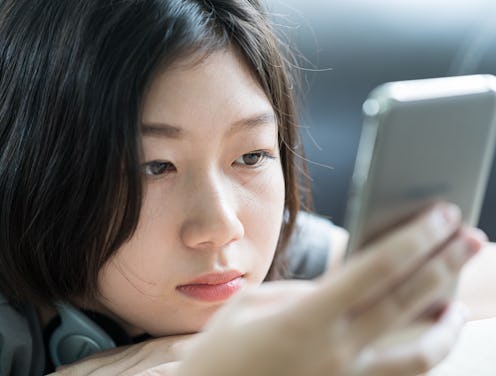Life
What Actually Happens In Your Brain Every Time You Get Lost Scrolling On Instagram

We've all been there: You've been sitting or lying down, scrolling through your Instagram feed for who knows how long now. You finally look at the time and realize a half hour has gone by. Though you might regret not using that time to check something off your to-do list, you're probably not thinking about how using Instagram for 30 minutes affects your brain. In reality, all of those scrolling sessions combined could have a serious impact on your mental health, even if you don't notice it right away.
It's no secret that overexposure to screen time can negatively affect our brains and bodies. This is mainly because of blue light, which is emitted by electronic device screens like your phone. According to a 2014 study conducted by Howard Hughes Medical Institute and University of Texas Southwestern Medical Center, blue light perpetuates sleep deficiency because of the light's ability to suppress melatonin, thereby affecting a person's sleeping and waking patterns. While this results in people not getting proper sleep, it can also impact how your brain focuses.
"The brain, depending on what one is watching, or reading, goes into an autopilot mode," Dr. Sanam Hafeez PsyD, a licensed psychologist and professor at Columbia University in New York City, tells Bustle. "Transitioning from one activity to another is usually a challenge when engrossed but when reward centers and dopamine triggers are activated, it becomes harder to engage." Ultimately, that makes you want to keep scrolling.
Melissa G. Hunt, Ph.D., associate director of Clinical Training at the University of Pennsylvania, tells Bustle that after 60 minutes of screen time, we begin to see more negative effects, not just in terms of sleep, but also in terms of our mental health. These extended periods of screen time could lead to depression, loneliness, anxiety, or worsened professional performance, she says.
Hunt isn't the only one that suggests putting a limit on social media use for the sake of your brain. A JAMA Psychiatry paper published in September 2019 studied almost 7,000 adolescents and their screen time. The study found that those who spent 30 or more minutes on social media, as compared to those who spent no time on it, were self-reportedly more likely to internalize their problems. This could be because extended periods of time on social media can make you feel lonely, according to a 2016 University of Pittsburgh Medical Center study on the association between social media use and depression.
Dr. Hunt explains that those who passively scroll through Instagram and other social media sites are also more likely to take part in upward social comparison, which can negatively affect your mental health. Even Instagram has recognized the pressure that comes with posting content to the platform, which is why it's been in talks of removing "likes" from the app since April. “We do hear people worry about how many like counts they get,” Head of Instagram Adam Mosseri said to BuzzFeed News. He explained that the platform was testing out hiding public "like" counts to create a "less pressurized environment where people feel comfortable expressing themselves."
But with or without likes, it can be hard to not get sucked up into the world of social media. Because of the reward centers that are triggered when you use the app, you stay on and keep scrolling, potentially perpetuating any bad feelings that come along with comparing yourself to others. Hunt says that in order to try and minimize the negative effects of social media, the solution is simple, yet easier said than done: limit screen time.
"Self-monitoring helps somewhat with limiting one’s time," Dr. Hunt says. "Set an alarm. Check your app usage at the end of every day to see how much time you’re actually spending. Commit to monitoring and limiting your usage and see if you feel better overall."
Studied referenced:
Chang, A. M., Aeschbach, D., Duffy, J. F., & Czeisler, C. A. (2015). Evening use of light-emitting eReaders negatively affects sleep, circadian timing, and next-morning alertness. Proceedings of the National Academy of Sciences, 112(4), 1232-1237. https://www.pnas.org/content/112/4/1232
Lin, L. Y., Sidani, J. E., Shensa, A., Radovic, A., Miller, E., Colditz, J. B., ... & Primack, B. A. (2016). Association between social media use and depression among US young adults. Depression and anxiety, 33(4), 323-331. https://www.ncbi.nlm.nih.gov/pubmed/26783723
Riehm KE, Feder KA, Tormohlen KN, et al. (2019). Associations Between Time Spent Using Social Media and Internalizing and Externalizing Problems Among US Youth. JAMA Psychiatry. https://doi.org/10.1001/jamapsychiatry.2019.2325
Experts:
Melissa G. Hunt, Ph.D., Associate Director of Clinical Training, University of Pennsylvania
Dr. Sanam Hafeez, PsyD, licensed psychologist, professor at Columbia University in New York City
This article was originally published on